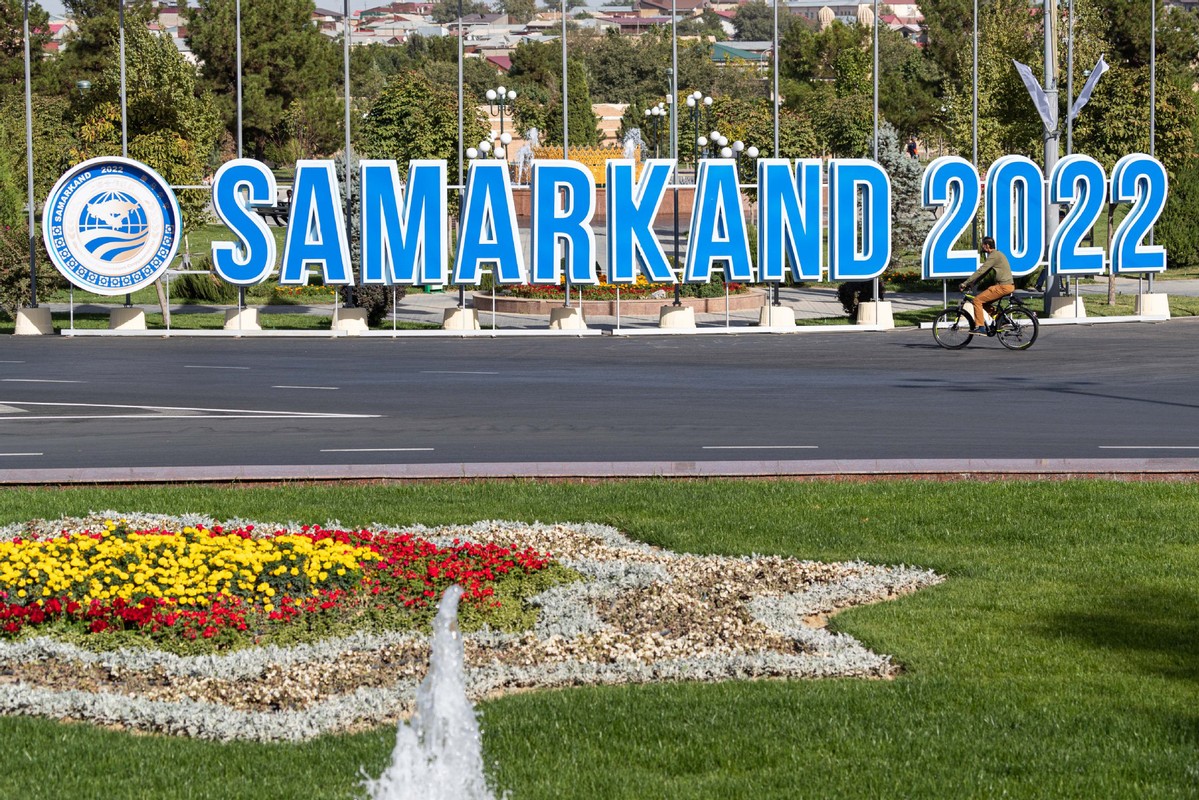SCO crucial in safeguarding regional security


The 22nd meeting of the Council of Heads of State of the Shanghai Cooperation Organization is being held on Thursday and Friday in the historical city of Samarkand, Uzbekistan. At a time when geopolitical conflict and nontraditional security threats such as extremism and terrorism are on the rise, the SCO plays an important role in safeguarding regional security and joint prosperity.
The international prestige and influence of the SCO-the only intergovernmental organization named after a Chinese city-have been steadily increasing since its establishment 21 years ago. Collectively, SCO member states plus Iran (an acceding member) account for half of the world's population, and their combined GDP, according to the World Bank, reached $23.5 trillion in 2021, accounting for 24 percent of the global GDP-14 times greater than when the SCO was founded.
The number of members has grown from the original "Shanghai Five" to an expanded membership of eight member states, four observer states and six dialogue partners. The SCO has also gradually established close ties with other regional organizations such as the Collective Security Treaty Organization, the Commonwealth of Independent States and the Association of Southeast Asian Nations. Last year, a memorandum of understanding was signed between the SCO and the League of Arab States, marking a new era of cooperation between the two organizations.
Over the years, the SCO has made considerable progress in its stated purposes.
In terms of security, the SCO has not only been successful in putting into place confidence-building measures among its member states in military affairs, but its members also cooperated extensively in battling nontraditional security threats.
The SCO was the first intergovernmental organization to include the fight against terrorism, separatism and extremism in its stated goals. It is also the first multilateral organization to clarify its definitions of terrorism and extremism.
In 2004, the SCO Regional Anti-Terrorist Structure was officially launched in Tashkent, Uzbekistan, as a permanent body of the SCO where member states routinely exchange intelligence, hold meetings of chiefs of general staff, provide anti-terrorist training and coordinate on joint military exercises, such as the "Peace Mission "drills under the SCO framework. The SCO has also established mechanisms to counter drug trafficking and enhance coordination on regional water security.
Economically, the SCO covers a diverse region. It includes the most resource-rich countries as well as the world's greatest manufacturing powerhouses. It has member states that are scientifically and technologically innovative as well as those that rely on technology transfer. Also among its members are the largest regional energy exporters and importers. These complementary advantages offer great scope and potential for economic cooperation.
Against this background, the SCO has formulated a long-term plan for regional economic development and promoted cooperation in energy, science and technology, information, transportation and other fields. Specifically, under the auspices of the Belt and Road Initiative, a large number of roads, rails and pipeline projects have been implemented, greatly increasing the interconnectedness of the region and making trade flows easier. As a result, trade in the region is among the fastest growing in the world. In 2021, the trade volume among the SCO members reached $651 billion, according to World Bank data-almost 20 times larger than when the SCO was founded.
Looking ahead, the SCO will play an ever larger role in promoting regional security and prosperity.
First, the region may be witnessing a renewed surge in international terrorism. Not only is the Islamic State establishing new branches in the region, but al-Qaida is also regrouping. Combined with cyber-fueled extremist ideologies, conditions are ripe for a rise in terrorist threats.
As the United States continues to divert funding and resources from its anti-terrorism efforts in order to focus on great power competition, the SCO will need to assume the leadership role in counterterrorism and safeguarding peace and security in the region.
Second, the world more than ever needs a strong SCO voice in regional affairs. Geopolitical conflict is on the rise across the world. As public opinion is often shaped by the West, the world also needs to hear from the most populous region in the world to form a balanced view. This requires the SCO to be more unified and vocal on the world stage and to actively play the positive role that it was established to perform.
Third, as a result of the outbreak of the Russia-Ukraine conflict and the ensuing anti-Russian sanctions, the regional economy is facing unprecedented challenges. SCO countries need to work more closely to find ways to protect their trade relations.
In this sense, the SCO summit this year could be a crucial step in the right direction.
The author is an associate professor at Hunan University's School of Public Policy. The views do not necessarily reflect those of China Daily.

































